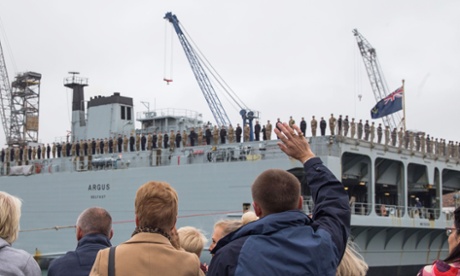
It may not be enough. It is certainly a bit late. But at least the response to the Ebola crisis in west Africa by the US, Britain and France now involves a significant commitment of people and resources. The same cannot be said of others among the world’s most influential countries, whose miserly and irresponsible reaction to the epidemic belies their claims to 21st century global leadership.
Ban Ki-moon, the UN secretary general, was not naming names when he spoke on Thursday of his dismay that some of the international community’s biggest players were not doing enough to combat what the World Health Organisation (WHO) terms a global security threat. But a large question mark hangs over the contributions of China and Russia, the two other permanent members of the UN security council, as well as other emerging powers including the remaining, supposedly up-and-coming Brics countries – Brazil, India and South Africa.
“This is a very serious problem” Ban said, referring to the fact that only $100,000 has been contributed to the UN’s $1bn Ebola fund. “It’s time that those other countries who really have capacity … provide financial and other logistical support,” he said. For the habitually cautious Ban, this was fighting talk.
About 4,500 people, mostly in west Africa, have died from Ebola since the epidemic began this year. Last month, the UN said $988m was needed to tackle the disease over the next six months. Since then $365m has been committed in Liberia, Sierra Leone and Guinea, the hardest-hit countries, but nearly all that money was donated directly to UN agencies and NGOs. Colombia, one of the world’s poorer countries, was alone in paying $100,000 into the UN fund.
So far, the Ebola response has been spearheaded by the usual suspects. Britain has taken the lead in assisting Sierra Leone, a former colony. Likewise, the US is centring its efforts on Liberia, with which it has historic ties, while France is concentrating on Guinea. The UN fund, if appropriately supported by other donors, could be used to supplement these efforts, which in Britain’s case involve £125m in bilateral assistance as well as the deployment of military assets and NHS volunteers.
David Cameron, and the international development secretary, Justine Greening, echoed Ban’s appeal on Friday, saying the US, Britain and France could not be expected to tackle the outbreak alone.
Speaking at a Europe-Asia summit in Milan, the British prime minister said: “This is the biggest health problem facing our world in a generation. It’s very likely to affect a number of the countries that are here today. Britain in my view has been leading the way … We are doing a huge amount and I think it’s time for other countries to look at their responsibilities and their resources and act in a similar way.”
Greening called on world leaders to “wake up” to the crisis. “I do think Ban Ki-moon is right … We need the international community to now step up to the plate.”
Jim Yong Kim, president of the World Bank, warned this week the international community had no choice but to support the battle against Ebola. “It is not a matter of choosing whether to do it or not. It’s just a question of when we pay the price for it,” he said. “Countries need to support the UN fund. They have to step up and they have to put the money in right now. It is the most rational thing to do from humanitarian, public health and economic perspective.”
If it was not apparent before, it is clear now that the Ebola threat is potentially global. The WHO said this week that 15 countries, neighbouring or trading with those where the epidemic is raging, were at risk. Medical experts suggest more cases in the US and Europe are unavoidable.
But a joined-up international approach remains a long way off. Speaking last month, the US president said the world should not “stand by” and expect the US and its western allies alone to shoulder the burden of combatting Ebola.
“This is should not about wrangling and waiting to see who will give what first,” Barack Obama said. “Do not stand by thinking somehow, because of what we [the US] have done, it’s taken care of. It’s not.”
Despite such pleas, the response of many, so far unaffected, countries remains unimpressive. China, the world’s second largest economy and a would-be global leader with extensive commercial interests in Africa, initially offered a paltry $38m in aid. On Thursday it raised that sum by $16m, saying it would help to train African healthcare workers and supply medical kits and ambulances.
In contrast, the US this week announced an additional $142m in humanitarian aid, on top of its extensive, previously announced, military and other multilateral assistance
Notwithstanding President Vladimir Putin’s repeated insistence on Russia’s revived superpower status, its contribution has been distinctly minor league, mainly comprising $1m in food aid. It has also sent disease specialists to west Africa and promised longer-term financial support for the WHO. Brazil has donated kits capable of protecting 2,500 people from Ebola. India has donated $10m.
The apparent reluctance of the 21st century’s emerging powers to take on a bigger role is not merely a matter of money. Politics plays a part, too. The leaders of these rising countries, proud of their enhanced standing, do not want to be viewed as tamely following in the west’s footsteps. Yet the paradox highlighted by this crisis is that even as they tell the western powers their day is done, China and others duck the responsibilities of global leadership.
